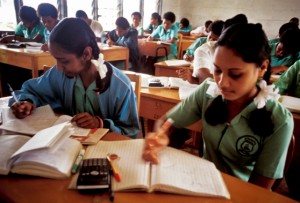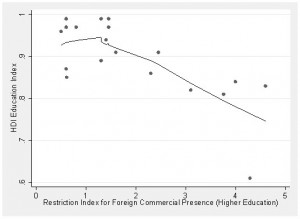 The services sector is becoming increasingly important in modern economies. In many of the most developed economies, it can represent two–thirds or even three–quarters of all economic activity. Even in developing economies, the services sector often accounts for a significant share of economic output and employment.
The services sector is becoming increasingly important in modern economies. In many of the most developed economies, it can represent two–thirds or even three–quarters of all economic activity. Even in developing economies, the services sector often accounts for a significant share of economic output and employment.
International trade in services is also increasing in importance, and has been growing more rapidly than goods trade over recent years. It has also proven to be more resilient to the global financial crisis and resulting trade collapse.
It has long been recognized that services trade can influence economic and social outcomes through a variety of mechanisms. On the one hand, the economic gains from reform are significant, and thus have the potential to promote human development by increasing per capita incomes. We refer to this linkage as the income channel.
However, there has been considerable controversy over possible incompatibilities between openness to services trade and the provision of human–development–related services such as electricity, water, and telecommunications. More broadly, a tension has emerged in the human development literature between the economic case for liberalizing services markets, and a perceived social case for maintaining stricter regulations in order to promote human development objectives.
From an economic point of view, there are good reasons to believe that services liberalization might be positively—not negatively—associated with at least some human development outcomes. The reason is that more efficient provision of public and private services that are important for development can lead to lower prices for consumers, and more widespread availability of human development–related services.
The most obvious non–income linkages between services sector regulation and human development are in sectors like health and education: performance in these areas are primary determinants of a country’s human development outcomes, as evidenced by their inclusion (together with income) in the Human Development Index. From a policy perspective, liberal policies towards education can increase availability of education services and improve student access to these services. Education is also seen as a great equalizer because it makes social and income mobility possible. Improved access translates into better human development outcomes both directly, and through the income channel by speeding up the accumulation of human capital, which is central to the economic growth and development process.
Although data availability on policy restrictiveness in education services is extremely limited, the available information supports our view that a less restrictive policy stance is associated with better development outcomes. Figure 1 shows a negative correlation between an index of trade restrictiveness computed by the Australian Productivity Commission and the Human Development Index education component. Although these kinds of associations need to be interpreted cautiously given data limitations1 and the fact that correlation does not necessarily imply causation, Figure 1 nonetheless represents some preliminary evidence in favor of a positive link between trade in education services and the education aspect of human development outcomes.
Figure 1: Education outcomes (vertical axis) versus restrictions on trade in education services (horizontal axis).

Figure 1: Education outcomes (vertical axis) versus restrictions on trade in education services (horizontal axis).
In our recent ADBI working paper, we found a non–income link between services and human development in the distribution sector (e.g., agricultural staples) and vaccines, among others.
Our preliminary analysis controlled whenever possible for a variety of other influences. We consistently find negative correlation between services sector regulation and performance and human development outcomes, even after controlling for income levels. Our results suggest that human development policies need to take a fresh look at how to incorporate the services dimension, and in particular the important role that regulatory reform and the reduction of entry barriers and regulatory restrictions can play in boosting performance and improving outcomes.
_____
1For example, there are only 19 sample countries for whom the Australian Productivity Commission has compiled data of rules and regulations in higher education.
Ben Shepherd and Gloria Pasadilla provide some of the first empirical evidence on the direct links between services sector regulation and human development in “Trade in Services and Human Development: A First Look at the Links,” ADBI Working Paper No. 268.








Comments are closed.